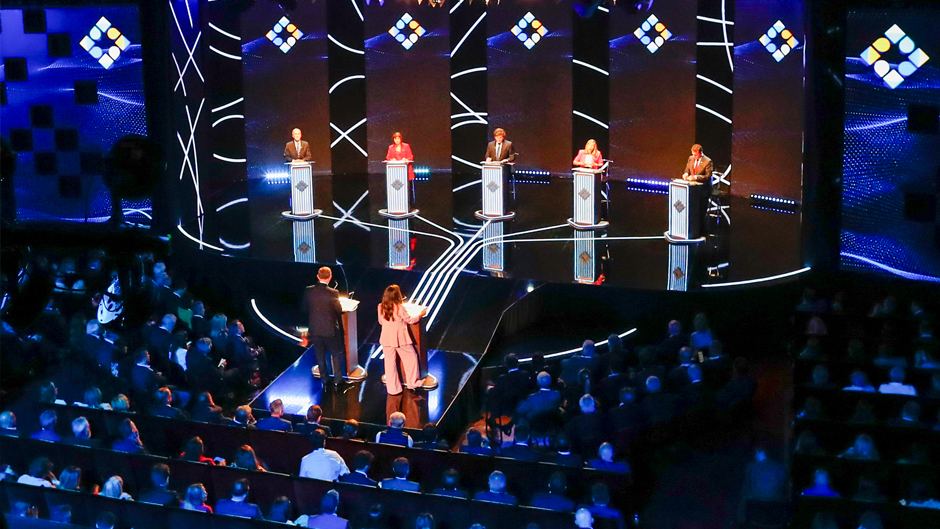Argentina, one of the largest economies in Latin America, has been facing a growing economic crisis fueled by extremely high inflation, polarization, an increase in poverty levels, and a growing discontent from its electorate.
A recent primary election for president pushed far-right candidate Javier Milei ahead as the leader of the pack, surprising pollsters and others. He will face economy minister Sergio Massa and former security minister Patricia Bullrich in the general election on Sunday, Oct. 22.
The rise of Milei has surprised political experts. With the exception of a time between 2015 to 2019, the “Peronists (the historic labor party) have held power in Argentina for the past two decades,” said John Twichell, a lecturer in the University of Miami College of Arts and Sciences and director of the Latin American Studies program.
Twichell pointed out that, for generations, establishment politicians, their parties, and their electoral coalitions have been a dominant force among Argentina’s political class. Yet political polarization, referred to as “la grieta” (the rift), has widened in recent years, leading to party fragmentation and—as a consequence—the establishment is struggling in its efforts not only to govern but also to form winning electoral coalitions, which is reflected in voter sentiment.
“In the years since their return to the Casa Rosada [presidential palace] under Alberto Fernandez’s presidency, the Peronists have presided over a pandemic-induced deluge of Argentina’s national economy, increasing crime levels, and exposure of corruption among elites,” said Twichell.
“From the electorate’s perspective the Peronists are squarely to blame for the dire economy as the most important issue, if not for the corruption and safety issues, as illustrated by the incumbent Fernandez’s decision not to run for reelection in the current campaign. So, out of the rift we see the emergence of maverick candidate Milei as the frontrunner candidate,” Twichell pointed out.
Inflation in Argentina has risen to 138.3 percent, the highest level since the early 1990s when Argentina was exiting hyperinflation, Bloomberg reported.
“Argentina’s economic situation has progressively deteriorated over the past few months,” said Laura Gómez-Mera, associate professor of political science. “The country faced a historic drought this year that severely affected agricultural output and exports, resulting in lower fiscal revenues and foreign exchange reserves.”
And “political uncertainties surrounding the upcoming elections have added pressure on the economy,’’ she added, “as inflation continues to soar and the value of the Argentine currency further weakens.”
High inflation levels in Argentina are the result of excessive printing of currency, reflecting the government’s inability to reduce public spending and increase revenues, she noted.
Milei, an economist and former TV pundit, has a bombastic personality and tends to use profanity when confronting contenders. He has promised to shutter the central bank, curtail the size of government, and eliminate the peso and adopt the U.S. dollar as the country’s currency.
“Milei and his radical platform appeal to voters at a moment in Argentine politics reminiscent of the 2001 economic crisis when the common voter refrain toward the political establishment was ‘que se vayan todos’ [throw them all out],” said Twichell.
But, according to Twichell, Milei’s controversial policy proposals, including the elimination of the Argentine peso and central bank and dollarization of the national economy, combined with his tactless political approach and tendencies call into question his ability to govern.
“Will he be able to negotiate with the opposition and other influential actors such as the International Monetary Fund to implement such policies if elected?” asked Twichell.
Milei’s wayward policies may be his opponents’ most compelling argument for the voters not to choose him in spite of their discontent with the establishment.
Massa, who is polling second behind Milei, represents the establishment alternative, yet he is more moderate than former President Alberto Fernandez. Bullrich promises to cut government spending to curb inflation, while also eliminating taxes on agricultural exports.
Although all candidates have pledged to introduce reforms to curb fiscal deficit and decrease inflation, Milei has put forward the most concrete—and extreme—proposal, said Gómez-Mera.
“It is unclear whether dollarization is technically and politically feasible and whether its expected benefits will outweigh its costs,” she said.
To avoid a runoff, candidates must either win more than 45 percent of the vote or at least 40 percent of the vote and 10 percent more than the second-place candidate. A second round of voting is tentatively scheduled for Nov. 19.

